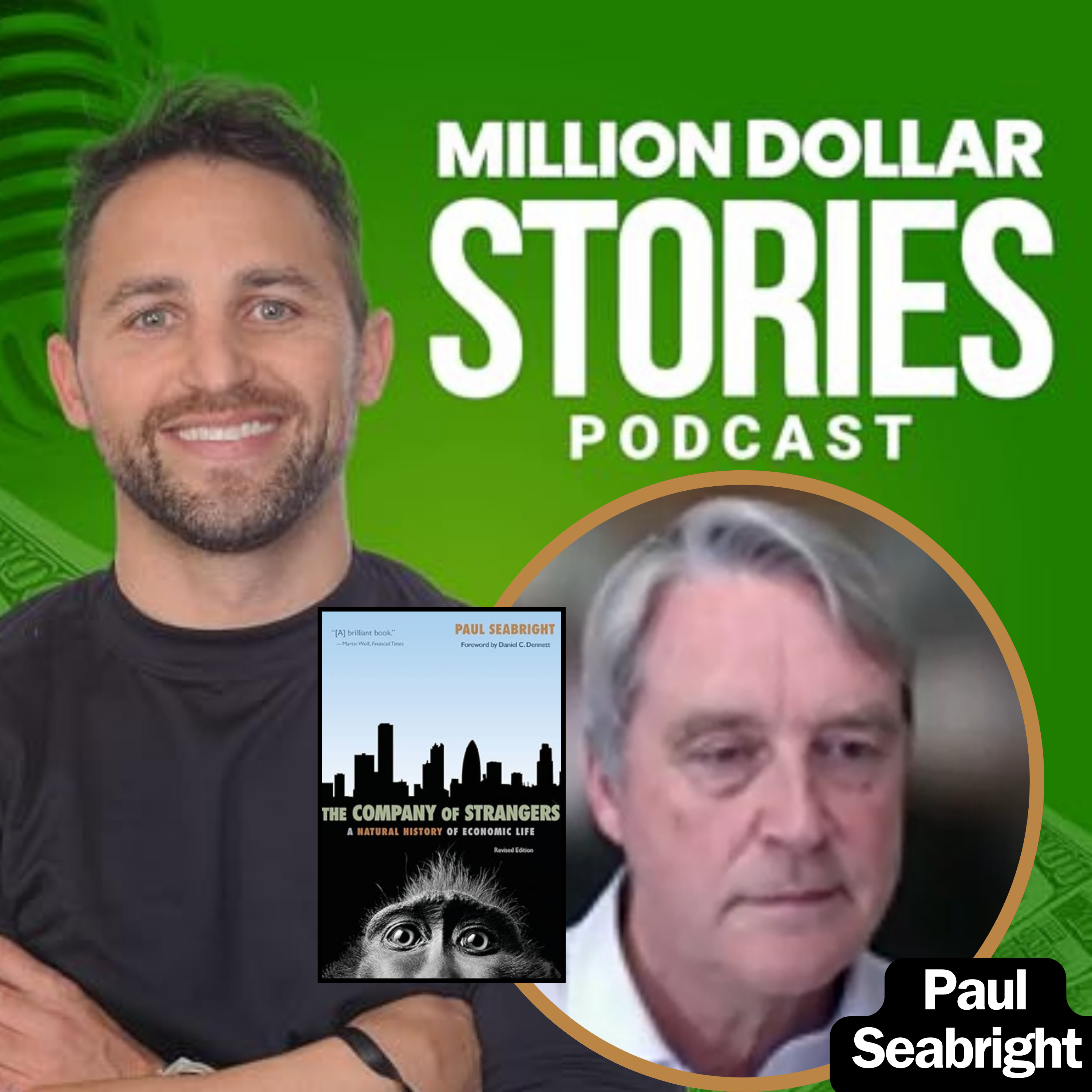Mike interviews Paul Seabright.
In a captivating and thought-provoking episode, the conversation dives into a fascinating exchange with Paul Seabright, author of “The Company of Strangers: A Natural History of Economic Life.” This episode delves into the evolutionary roots of human behaviours, exploring how past and present interactions shape the economic landscapes we navigate today.
Paul Seabright’s insights into the origins of laughter set the stage for understanding the complex interplay between humour and trust. As Seabright explains, Laughter is uniquely human yet finds echoes in the animal kingdom, particularly among monkeys and apes. Picture a group of monkeys in the forest, one spotting an eagle overhead—a clear danger. The alarm call is urgent, a cry to seek safety. But once the threat passes, there’s a different call, almost like laughter, signalling it’s safe again. Seabright connects this primal reaction to our modern sense of humour, where we laugh at jokes involving minor mishaps, relieved that the danger has passed without severe harm. He posits that This laughter fosters trust, assuring us that everything will be alright despite the world’s dangers.
Seabright’s exploration of social learning in monkeys is equally riveting. He recounts a study where monkeys were conditioned to avoid a rope, thinking it was a snake, demonstrating how fear and caution can be socially transmitted. This behaviour underscores the importance of social learning and its evolutionary benefits, which extend to humans. In human societies, our ability to learn from others has led to complex social structures and cultural norms, shaping our economic interactions.
The conversation then shifts to the age-old debate of nature versus nurture. Seabright delves into how our genetic predispositions and environmental influences intertwine to form our behaviours and decisions. He argues that while our genes lay the groundwork, our environment moulds and refines our actions. This blend of nature and nurture is evident in economic behaviours, where cultural context and individual experiences play crucial roles in shaping economic choices.
One particularly intriguing part of the episode is the discussion on how trauma and behaviours can be passed down through generations. Seabright explains the concept of epigenetics, where experiences, especially traumatic ones, can leave marks on our DNA, influencing future generations. This revelation is profound, suggesting that our economic behaviours and attitudes towards money and risk may be deeply rooted in the experiences of our ancestors.
The dynamics of power and cooperation, a recurring theme in Seabright’s work, also take center stage in this episode. He draws parallels between human societies and primate groups, highlighting how power dynamics influence social and economic interactions. Cooperation is essential for survival and prosperity in humans and primates, yet it is often marred by power struggles and competition. Seabright’s insights into these dynamics offer a fresh perspective on economic life, emphasizing the delicate balance between competition and cooperation.
Seabright touches on the complexities of human relationships and intelligence as the conversation progresses. He discusses how our advanced cognitive abilities and social complexities have led to developing sophisticated economic systems. Our ability to form relationships, build trust, and collaborate on large scales has been crucial in the evolution of economic life. Seabright’s reflections remind us that our financial systems are not just about numbers and transactions but are deeply rooted in human nature and social behaviours.
Towards the end of the episode, the discussion turns to Seabright’s other works, particularly “The Divine Economy” and “The War of the Sexes.” These books, like “The Company of Strangers,” explore the intersections of biology, economics, and human behaviour. Seabright’s multidisciplinary approach provides a holistic understanding of economic life, bridging gaps between seemingly disparate fields.
“The Company of Strangers” is more than just a book on economics; it is a journey through the history of human cooperation, trust, and social evolution. Seabright unveils the intricate tapestry of human economic life woven with biology, psychology, and social learning threads through this conversation. This episode is a treasure trove of insights for anyone interested in understanding the deeper currents that shape our economic world.
The episode blends insightful discussion, engaging storytelling, and profound revelations in this style. It leaves listeners with a greater appreciation of the complexities of human nature and the economic systems we navigate daily. So, whether you’re an entrepreneur, an economist, or just someone curious about the human condition, this episode offers valuable lessons and thought-provoking perspectives that will resonate long after the conversation ends.
Mike Fallat, aka The BookMan, is the owner of Dreamstarters Publishing and the Million Dollar Book Agency. They have helped 300+ entrepreneurs become bestselling authors. His goal is to help 1,000 entrepreneurs publish books and teach them how to use their books as a gateway to generating 7-figures.
Visit website for more information: https://www.milliondollarbookagency.com/
[{"id":2474,"link":"https:\/\/blog.milliondollarbookagency.com\/dana-caspersen-author-of-changing-the-conversation-the-17-principles-of-conflict-resolution\/","name":"dana-caspersen-author-of-changing-the-conversation-the-17-principles-of-conflict-resolution","thumbnail":{"url":"https:\/\/blog.milliondollarbookagency.com\/wp-content\/uploads\/2025\/01\/Dana-Caspersen.png","alt":""},"title":"Dana Caspersen - Author of \"Changing the Conversation: The 17 Principles of Conflict Resolution\"","author":{"name":"Bookman Forever","link":"https:\/\/blog.milliondollarbookagency.com\/author\/mdbapodcast\/"},"date":"Jan 20, 2025","dateGMT":"2025-01-20 11:00:00","modifiedDate":"2025-01-17 16:47:41","modifiedDateGMT":"2025-01-17 16:47:41","commentCount":"0","commentStatus":"open","categories":{"coma":"<a href=\"https:\/\/blog.milliondollarbookagency.com\/category\/podcasts\/\" rel=\"category tag\">Podcasts<\/a>","space":"<a href=\"https:\/\/blog.milliondollarbookagency.com\/category\/podcasts\/\" rel=\"category tag\">Podcasts<\/a>"},"taxonomies":{"post_tag":""},"readTime":{"min":4,"sec":48},"status":"publish","excerpt":""},{"id":2469,"link":"https:\/\/blog.milliondollarbookagency.com\/melissa-smith-author-of-hire-the-right-virtual-assistant-how-the-right-va-will-make-your-life-easier-create-time-and-make-you-more-money\/","name":"melissa-smith-author-of-hire-the-right-virtual-assistant-how-the-right-va-will-make-your-life-easier-create-time-and-make-you-more-money","thumbnail":{"url":"https:\/\/blog.milliondollarbookagency.com\/wp-content\/uploads\/2025\/01\/Melissa-Smith.png","alt":""},"title":"Melissa Smith - Author of \"Hire the Right Virtual Assistant: How the Right VA Will Make Your Life Easier, Create Time, and Make You More Money\"","author":{"name":"Bookman Forever","link":"https:\/\/blog.milliondollarbookagency.com\/author\/mdbapodcast\/"},"date":"Jan 17, 2025","dateGMT":"2025-01-17 16:08:32","modifiedDate":"2025-01-17 16:08:35","modifiedDateGMT":"2025-01-17 16:08:35","commentCount":"0","commentStatus":"open","categories":{"coma":"<a href=\"https:\/\/blog.milliondollarbookagency.com\/category\/podcasts\/\" rel=\"category tag\">Podcasts<\/a>","space":"<a href=\"https:\/\/blog.milliondollarbookagency.com\/category\/podcasts\/\" rel=\"category tag\">Podcasts<\/a>"},"taxonomies":{"post_tag":""},"readTime":{"min":5,"sec":19},"status":"publish","excerpt":""},{"id":2459,"link":"https:\/\/blog.milliondollarbookagency.com\/beverly-kaye-author-of-love-em-or-lose-em-sixth-edition-getting-good-people-to-stay\/","name":"beverly-kaye-author-of-love-em-or-lose-em-sixth-edition-getting-good-people-to-stay","thumbnail":{"url":"https:\/\/blog.milliondollarbookagency.com\/wp-content\/uploads\/2025\/01\/Beverly-Kaye.png","alt":""},"title":"Beverly Kaye - Author of \"Love \u2019Em or Lose \u2019Em, Sixth Edition: Getting Good People to Stay\"","author":{"name":"Bookman Forever","link":"https:\/\/blog.milliondollarbookagency.com\/author\/mdbapodcast\/"},"date":"Jan 10, 2025","dateGMT":"2025-01-10 11:20:00","modifiedDate":"2025-01-09 15:28:32","modifiedDateGMT":"2025-01-09 15:28:32","commentCount":"0","commentStatus":"open","categories":{"coma":"<a href=\"https:\/\/blog.milliondollarbookagency.com\/category\/podcasts\/\" rel=\"category tag\">Podcasts<\/a>","space":"<a href=\"https:\/\/blog.milliondollarbookagency.com\/category\/podcasts\/\" rel=\"category tag\">Podcasts<\/a>"},"taxonomies":{"post_tag":""},"readTime":{"min":5,"sec":7},"status":"publish","excerpt":""},{"id":2454,"link":"https:\/\/blog.milliondollarbookagency.com\/stephen-skelton-author-of-viticulture-2nd-edition-an-introduction-to-commercial-grape-growing-for-wine-production\/","name":"stephen-skelton-author-of-viticulture-2nd-edition-an-introduction-to-commercial-grape-growing-for-wine-production","thumbnail":{"url":"https:\/\/blog.milliondollarbookagency.com\/wp-content\/uploads\/2025\/01\/Stephen-Skelton.png","alt":""},"title":"Stephen Skelton - Author of \"Viticulture - 2nd Edition: An Introduction to Commercial Grape Growing for Wine Production\"","author":{"name":"Bookman Forever","link":"https:\/\/blog.milliondollarbookagency.com\/author\/mdbapodcast\/"},"date":"Jan 9, 2025","dateGMT":"2025-01-09 15:11:29","modifiedDate":"2025-01-09 15:11:33","modifiedDateGMT":"2025-01-09 15:11:33","commentCount":"0","commentStatus":"open","categories":{"coma":"<a href=\"https:\/\/blog.milliondollarbookagency.com\/category\/podcasts\/\" rel=\"category tag\">Podcasts<\/a>","space":"<a href=\"https:\/\/blog.milliondollarbookagency.com\/category\/podcasts\/\" rel=\"category tag\">Podcasts<\/a>"},"taxonomies":{"post_tag":""},"readTime":{"min":5,"sec":20},"status":"publish","excerpt":""},{"id":2448,"link":"https:\/\/blog.milliondollarbookagency.com\/david-brier-author-of-rich-brand-poor-brand-how-to-unleash-your-david-in-a-world-of-goliaths\/","name":"david-brier-author-of-rich-brand-poor-brand-how-to-unleash-your-david-in-a-world-of-goliaths","thumbnail":{"url":"https:\/\/blog.milliondollarbookagency.com\/wp-content\/uploads\/2025\/01\/David-Brier.png","alt":""},"title":"David Brier - Author of \"Rich Brand Poor Brand: How to Unleash Your David in a World of Goliaths\"","author":{"name":"Bookman Forever","link":"https:\/\/blog.milliondollarbookagency.com\/author\/mdbapodcast\/"},"date":"Jan 6, 2025","dateGMT":"2025-01-06 16:03:34","modifiedDate":"2025-01-06 16:03:37","modifiedDateGMT":"2025-01-06 16:03:37","commentCount":"0","commentStatus":"open","categories":{"coma":"<a href=\"https:\/\/blog.milliondollarbookagency.com\/category\/podcasts\/\" rel=\"category tag\">Podcasts<\/a>","space":"<a href=\"https:\/\/blog.milliondollarbookagency.com\/category\/podcasts\/\" rel=\"category tag\">Podcasts<\/a>"},"taxonomies":{"post_tag":""},"readTime":{"min":4,"sec":22},"status":"publish","excerpt":""},{"id":2438,"link":"https:\/\/blog.milliondollarbookagency.com\/stephanie-seneff-author-of-toxic-legacy-how-the-weedkiller-glyphosate-is-destroying-our-health-and-the-environment\/","name":"stephanie-seneff-author-of-toxic-legacy-how-the-weedkiller-glyphosate-is-destroying-our-health-and-the-environment","thumbnail":{"url":"https:\/\/blog.milliondollarbookagency.com\/wp-content\/uploads\/2024\/12\/Stephanie-Seneff.png","alt":""},"title":"Stephanie Seneff - Author of \"Toxic Legacy: How the Weedkiller Glyphosate Is Destroying Our Health and the Environment\"","author":{"name":"Bookman Forever","link":"https:\/\/blog.milliondollarbookagency.com\/author\/mdbapodcast\/"},"date":"Dec 31, 2024","dateGMT":"2024-12-31 15:18:24","modifiedDate":"2024-12-31 15:18:28","modifiedDateGMT":"2024-12-31 15:18:28","commentCount":"0","commentStatus":"open","categories":{"coma":"<a href=\"https:\/\/blog.milliondollarbookagency.com\/category\/podcasts\/\" rel=\"category tag\">Podcasts<\/a>","space":"<a href=\"https:\/\/blog.milliondollarbookagency.com\/category\/podcasts\/\" rel=\"category tag\">Podcasts<\/a>"},"taxonomies":{"post_tag":""},"readTime":{"min":4,"sec":41},"status":"publish","excerpt":""},{"id":2420,"link":"https:\/\/blog.milliondollarbookagency.com\/steve-selengut-author-of-retirement-money-secrets-a-financial-insiders-guide-to-income-independence\/","name":"steve-selengut-author-of-retirement-money-secrets-a-financial-insiders-guide-to-income-independence","thumbnail":{"url":"https:\/\/blog.milliondollarbookagency.com\/wp-content\/uploads\/2024\/12\/Steve-Selengut.png","alt":""},"title":"Steve Selengut - Author of \"Retirement Money Secrets: A Financial Insider's Guide to Income Independence\"","author":{"name":"Bookman Forever","link":"https:\/\/blog.milliondollarbookagency.com\/author\/mdbapodcast\/"},"date":"Dec 23, 2024","dateGMT":"2024-12-23 11:00:00","modifiedDate":"2024-12-21 16:20:18","modifiedDateGMT":"2024-12-21 16:20:18","commentCount":"0","commentStatus":"open","categories":{"coma":"<a href=\"https:\/\/blog.milliondollarbookagency.com\/category\/podcasts\/\" rel=\"category tag\">Podcasts<\/a>","space":"<a href=\"https:\/\/blog.milliondollarbookagency.com\/category\/podcasts\/\" rel=\"category tag\">Podcasts<\/a>"},"taxonomies":{"post_tag":""},"readTime":{"min":5,"sec":7},"status":"publish","excerpt":""},{"id":2393,"link":"https:\/\/blog.milliondollarbookagency.com\/dr-steven-yacovelli-author-of-your-queer-career-workplace-advice-from-the-gay-leadership-dude\/","name":"dr-steven-yacovelli-author-of-your-queer-career-workplace-advice-from-the-gay-leadership-dude","thumbnail":{"url":"https:\/\/blog.milliondollarbookagency.com\/wp-content\/uploads\/2024\/12\/steve-yacovelli.png","alt":""},"title":"Dr. Steven Yacovelli - Author of \"Your Queer Career: Workplace Advice from \"The Gay Leadership Dude.\"","author":{"name":"Bookman Forever","link":"https:\/\/blog.milliondollarbookagency.com\/author\/mdbapodcast\/"},"date":"Dec 16, 2024","dateGMT":"2024-12-16 11:53:00","modifiedDate":"2024-12-13 17:53:56","modifiedDateGMT":"2024-12-13 17:53:56","commentCount":"0","commentStatus":"open","categories":{"coma":"<a href=\"https:\/\/blog.milliondollarbookagency.com\/category\/podcasts\/\" rel=\"category tag\">Podcasts<\/a>","space":"<a href=\"https:\/\/blog.milliondollarbookagency.com\/category\/podcasts\/\" rel=\"category tag\">Podcasts<\/a>"},"taxonomies":{"post_tag":""},"readTime":{"min":4,"sec":49},"status":"publish","excerpt":""},{"id":2385,"link":"https:\/\/blog.milliondollarbookagency.com\/janelle-brittain-author-of-how-to-say-it-performance-reviews-phrases-and-strategies-for-painless-and-productive-performance-reviews\/","name":"janelle-brittain-author-of-how-to-say-it-performance-reviews-phrases-and-strategies-for-painless-and-productive-performance-reviews","thumbnail":{"url":"https:\/\/blog.milliondollarbookagency.com\/wp-content\/uploads\/2024\/12\/Janelle-Brittai.png","alt":""},"title":"Janelle Brittain - Author of \"How To Say It Performance Reviews: Phrases and Strategies for Painless and Productive Performance Reviews\"","author":{"name":"Bookman Forever","link":"https:\/\/blog.milliondollarbookagency.com\/author\/mdbapodcast\/"},"date":"Dec 13, 2024","dateGMT":"2024-12-13 17:42:59","modifiedDate":"2024-12-13 17:43:03","modifiedDateGMT":"2024-12-13 17:43:03","commentCount":"0","commentStatus":"open","categories":{"coma":"<a href=\"https:\/\/blog.milliondollarbookagency.com\/category\/podcasts\/\" rel=\"category tag\">Podcasts<\/a>","space":"<a href=\"https:\/\/blog.milliondollarbookagency.com\/category\/podcasts\/\" rel=\"category tag\">Podcasts<\/a>"},"taxonomies":{"post_tag":""},"readTime":{"min":5,"sec":0},"status":"publish","excerpt":""},{"id":2369,"link":"https:\/\/blog.milliondollarbookagency.com\/paul-falcone-author-of-101-tough-conversations-to-have-with-employees-a-managers-guide-to-addressing-performance-conduct-and-discipline-challenges\/","name":"paul-falcone-author-of-101-tough-conversations-to-have-with-employees-a-managers-guide-to-addressing-performance-conduct-and-discipline-challenges","thumbnail":{"url":"https:\/\/blog.milliondollarbookagency.com\/wp-content\/uploads\/2024\/12\/Paul-Falcone.png","alt":""},"title":"Paul Falcone - Author of \"101 Tough Conversations to Have with Employees: A Manager's Guide to Addressing Performance, Conduct, and Discipline Challenges\"","author":{"name":"Bookman Forever","link":"https:\/\/blog.milliondollarbookagency.com\/author\/mdbapodcast\/"},"date":"Dec 10, 2024","dateGMT":"2024-12-10 15:09:01","modifiedDate":"2024-12-10 15:09:05","modifiedDateGMT":"2024-12-10 15:09:05","commentCount":"0","commentStatus":"open","categories":{"coma":"<a href=\"https:\/\/blog.milliondollarbookagency.com\/category\/podcasts\/\" rel=\"category tag\">Podcasts<\/a>","space":"<a href=\"https:\/\/blog.milliondollarbookagency.com\/category\/podcasts\/\" rel=\"category tag\">Podcasts<\/a>"},"taxonomies":{"post_tag":""},"readTime":{"min":5,"sec":11},"status":"publish","excerpt":""},{"id":2362,"link":"https:\/\/blog.milliondollarbookagency.com\/julie-winkle-giulioni-co-author-of-help-them-grow-or-watch-them-go-career-conversations-organizations-need-and-employees-still-want\/","name":"julie-winkle-giulioni-co-author-of-help-them-grow-or-watch-them-go-career-conversations-organizations-need-and-employees-still-want","thumbnail":{"url":"https:\/\/blog.milliondollarbookagency.com\/wp-content\/uploads\/2024\/12\/Julie-Winkle.png","alt":""},"title":"Julie Winkle Giulioni - Co-Author of \"Help Them Grow or Watch Them Go: Career Conversations Organizations Need and Employees Still Want\"","author":{"name":"Bookman Forever","link":"https:\/\/blog.milliondollarbookagency.com\/author\/mdbapodcast\/"},"date":"Dec 5, 2024","dateGMT":"2024-12-05 17:12:14","modifiedDate":"2024-12-05 17:12:18","modifiedDateGMT":"2024-12-05 17:12:18","commentCount":"0","commentStatus":"open","categories":{"coma":"<a href=\"https:\/\/blog.milliondollarbookagency.com\/category\/podcasts\/\" rel=\"category tag\">Podcasts<\/a>","space":"<a href=\"https:\/\/blog.milliondollarbookagency.com\/category\/podcasts\/\" rel=\"category tag\">Podcasts<\/a>"},"taxonomies":{"post_tag":""},"readTime":{"min":4,"sec":48},"status":"publish","excerpt":""},{"id":2346,"link":"https:\/\/blog.milliondollarbookagency.com\/jessica-pettitt-author-of-almost-doing-good-doing-the-best-that-you-can-with-what-you-have-some-of-the-time\/","name":"jessica-pettitt-author-of-almost-doing-good-doing-the-best-that-you-can-with-what-you-have-some-of-the-time","thumbnail":{"url":"https:\/\/blog.milliondollarbookagency.com\/wp-content\/uploads\/2024\/11\/Jessica-Pettitt.png","alt":""},"title":"Jessica Pettitt - Author of \"Almost Doing Good: Doing the Best That You Can With What You Have Some of the Time\"","author":{"name":"Bookman Forever","link":"https:\/\/blog.milliondollarbookagency.com\/author\/mdbapodcast\/"},"date":"Dec 2, 2024","dateGMT":"2024-12-02 11:04:00","modifiedDate":"2024-11-30 19:11:42","modifiedDateGMT":"2024-11-30 19:11:42","commentCount":"0","commentStatus":"open","categories":{"coma":"<a href=\"https:\/\/blog.milliondollarbookagency.com\/category\/podcasts\/\" rel=\"category tag\">Podcasts<\/a>","space":"<a href=\"https:\/\/blog.milliondollarbookagency.com\/category\/podcasts\/\" rel=\"category tag\">Podcasts<\/a>"},"taxonomies":{"post_tag":""},"readTime":{"min":4,"sec":51},"status":"publish","excerpt":""}]


